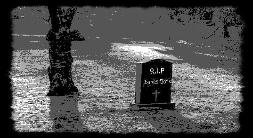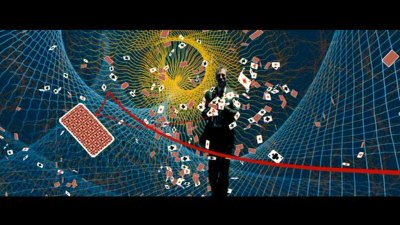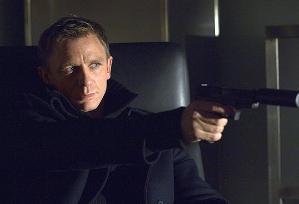
Daniel Craig (Bond). Craig’s characterization of Bond is charmless, worthless, and disturbingly nihilistic. At one point in the script, Craig’s Bond responds to a question with “Do I look like I give a damn?” The answer in “Casino Royale” is overwhelmingly NO. Why on earth, then, should the audience care about him? At another point, he tells Vesper “I have no idea what an honest job is.” Is this a credible (or creditable) moral statement to hear from a top-level government secret agent? Craig’s monotonously stoic performance is by no means compensated for by his (atrocious) line readings: he articulates rarely, mumbles often. As a result of Craig’s hollow Bond interpretation, what should have been the film’s ultimate impact moment—007’s “Bond, James Bond” confrontation with villainous Mr. White—is surprisingly anti-climactic, prompting a shrug rather than a cheer from this reviewer.
……
“Casino Royale” is the highest-grossing Bond film to date. But consider:
* This fact merely indicates the degree of public curiosity about or interest in James Bond and owes virtually everything to the franchise’s longstanding cinematic appeal and reputation (earned by much better films and performances in the series and betrayed dramatically by “Casino Royale”).
* This fact confirms nothing about public satisfaction with or approval of this latest installment.
* High box-office numbers neither reflect nor establish this film’s merit.
Special thanks to “Terry” & Stephen
Click Here To Discuss This In Our Forum
Review by northbreed
Rotten TomatoesEver notice that the 007 films produced after “Goldeneye” seem to get worse and worse in significant critical, creative respects like screenplay quality, casting decisions, etc.? With “Casino Royale,” the franchise hits rock bottom. “Casino Royale” is, objectively, the worst James Bond film in the history of the 007 film franchise. Why?
1) Story: Based, more or less, on Ian Fleming’s original novel, this unskillful adaptation/update is communicated with a disdain for clarity. The audience is fed too little information, too late (or not at all)—about both character motivations as well as the stakes involved in various action sequences—to remain emotionally engaged and genuinely interested in what’s going on.
2) Casting/characterization: lacks conviction and appeal
· Daniel Craig (Bond). Craig’s characterization of Bond is charmless, worthless, and disturbingly nihilistic. At one point in the script, Craig’s Bond responds to a question with “Do I look like I give a damn?” The answer in “Casino Royale” is overwhelmingly NO. Why on earth, then, should the audience care about him? At another point, he tells Vesper “I have no idea what an honest job is.” Is this a credible (or creditable) moral statement to hear from a top-level government secret agent? Craig’s monotonously stoic performance is by no means compensated for by his (atrocious) line readings: he articulates rarely, mumbles often. As a result of Craig’s hollow Bond interpretation, what should have been the film’s ultimate impact moment—007’s “Bond, James Bond” confrontation with villainous Mr. White—is surprisingly anti-climactic, prompting a shrug rather than a cheer from this reviewer.
· Eva Green (“Bond Girl,” Vesper Lynd). Green’s Vesper characterization comes across unwittingly as awkward, unsophisticated. Green looks and acts like a teenager playing at “grown-up.” What’s missing is the mature presence/feminine poise that typifies the best Bond Girl actresses (e.g. Ursula Andress, Honor Blackman, Diana Rigg, Barbara Bach, Maud Adams, Izabella Scorupco, et al). A self-confessed “complicated woman,” Green’s Vesper remains maddeningly inscrutable to the end, and her romance with Craig’s Bond is ineptly developed and unconvincingly consummated.
· Judi Dench. Her “M” is more unsympathetic than ever. No other actress has ever contributed less charm and more unfemininity to the Bond series than Dame Judi Dench.
· Mads Mikkelsen (Le Chiffre). In Ian Fleming’s novel, Le Chiffre is skillfully characterized as an odd, sinister presence. Onscreen, Mikkelsen’s version of Le Chiffre is unimpressive—an effete villain with a blood-weepy eye, but without the twisted charisma that typifies the best Bond screen adversaries (Goldfinger, Blofeld, Mr. Big, Max Zorin, Janus, et al).
3) Script/dialogue. Both in content and tone, the screenplay—like the novel—overwhelmingly projects malevolence: the power of evil; the stress on the tragic and traumatic; all events taking place in a world where no one can or ought to be trusted. And notice how the script flagrantly undercuts James Bond, the ultimate fictional egoist, with the inclusion of damning “anti-ego” lines thrown at him by M and Vesper. The dialogue is cynical, tasteless, and witless.
4) Original Music: Chris Cornell’s unmemorable opening-credits theme song—“You Know My Name”—lacks color, drama, and excitement. David Arnold’s unremarkable score sounds melodramatic and overly derivative, like a cheap John Barry knock off.
5) Producer infamy/creative poverty: Michael G. Wilson and Barbara Broccoli, the film’s producers, lacking the vision and ingenuity to advance Bond’s personal timeline onscreen, reveal their creative bankruptcy by bringing 007 back to the beginning of his secret service career, presenting him in his most unflattering incarnation yet. Out go Bond’s cinematically-cultivated charm and conviction. The new Bond is an uninteresting, expressionless, muscle-bound nihilist and a disgracefully vulnerable “hero.” The producers deliberately emphasize Bond’s vulnerability by subjecting him, incredibly, to cardiac arrest(!) as well as a horrific trial of torture (this latter was a rotten, graphic part of Fleming’s original novel). Putting obstacles in a purposeful screen hero’s path makes for good drama; but these shocking “Casino-Royale” examples are an extremely sick way to challenge a hero and are certainly artistically unworthy of depiction onscreen.
Considering all these points, it is clear that “Casino Royale” is neither value-driven art nor fan-pleasing entertainment. The proof is in the picture.
“Casino Royale” is the highest-grossing Bond film to date. But consider:
* This fact merely indicates the degree of public curiosity about or interest in James Bond and owes virtually everything to the franchise’s longstanding cinematic appeal and reputation (earned by much better films and performances in the series and betrayed dramatically by “Casino Royale”).
* This fact confirms nothing about public satisfaction with or approval of this latest installment.
* High box-office numbers neither reflect nor establish this film’s merit.The 2-disc DVD special edition of this movie has a handful of special features. Apart from the inclusion of Maryam d’Abo’s thoughtfully-produced “Bond Girls Are Forever” (2002) documentary, why should you give a damn?
Special thanks to “Terry” & Stephen
Click Here To Discuss This In Our Forum



